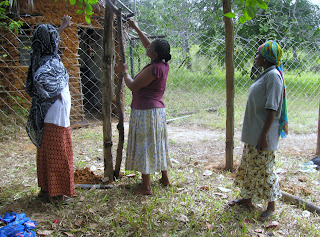Our most recent intern, Noelle Voges, has just returned from Kenya. Here she shares some of her experience with you. Our organization and the community was grateful she lent her time and talents to making a difference there, and that she did in a relatively short amount of time. Noelle continues to support the organization State-side.
"I returned to the States only two weeks ago, and I am
already itching to return to the welcoming and beautiful village of Takaungu.
Before beginning my internship with the EAC, I was graciously greeted into my
homestay. This large family of 12 made me feel right at home by allowing me to
be their shadow around the village, introducing me to their friends and extended
family members, teaching me how to cook local Swahili dishes, and helping me
learn ‘easy’ Swahili phrases. Although, no matter how many times I practiced, I
somehow always ended up saying, “I’m getting married tomorrow” instead of “I
will see you tomorrow”!
Aisha, my amazing homestay mother, and I, in her new home.
Fatma, one of the young ladies in my homestay, and I,
putting farufaru in bags to be sold at Vutakaka Primary School.
I am so lucky to have had such an amazing internship
experience with the EAC! My focus in graduate school is on public health and
community development, and the EAC was the perfect fit for both of these
interests. The EAC is truly instrumental in the Takaungu community, along with
the neighboring villages. I primarily worked with the EAC’s community health
team, which consisted of three hardworking and passionate people, whom I now
call my friends. Mohamed, Joyce, and Joy would travel many miles each day on
foot, bicycle, or Boda Boda to reach a targeted group of individuals for their
health education programs. As part of the Stay Alive Program implemented by the
EAC, students received information on HIV/AIDS prevention and basic health and
hygiene education with the goal of establishing healthier lifestyles.
One of my favorite experiences was being a part of the ‘Kick
Polio Out of Africa’ campaign launched by the World Health Organization, guided
by Kenya’s Ministry of Health, and implemented in Takaungu and three
neighboring villages by members of the EAC, volunteers, and employees of the
local dispensary in Takaungu. We walked door-to-door in various villages looking
for children under the age of 5 to administer the polio booster vaccination,
and we documented the households and locations where we traveled so other health
teams would not repeat the area we had already reached. It was inspiring to see
so many individuals helping in this cause, and I was also surprised to see how
willing the parents were in letting us inoculate their children without
questioning our authority or medical knowledge. In one afternoon, the health
team I was assigned to inoculated 107 children and visited 79 households and 2
nursery schools.
Administering the polio
vaccination to a willing child.
My time with the EAC was pivotal in helping to evaluate my
public health interests as my time in graduate school comes to an end this
year. I’m looking forward to speaking to future public health graduate students
about the exciting work the EAC is doing in the coastal village of Takaungu, and
hopefully it will inspire others to intern with this great organization. Takaungu
will always be special to me, and I will forever speak fondly of my time
interning with the EAC."






































